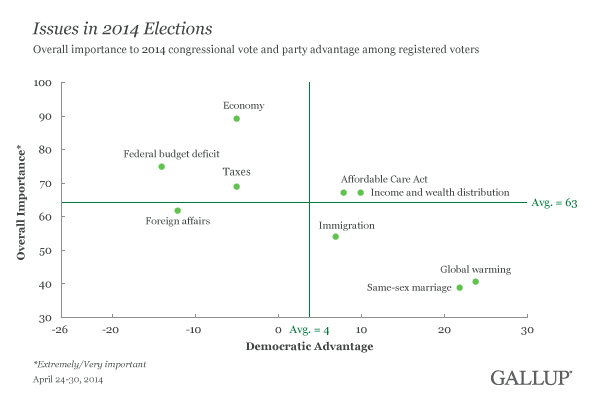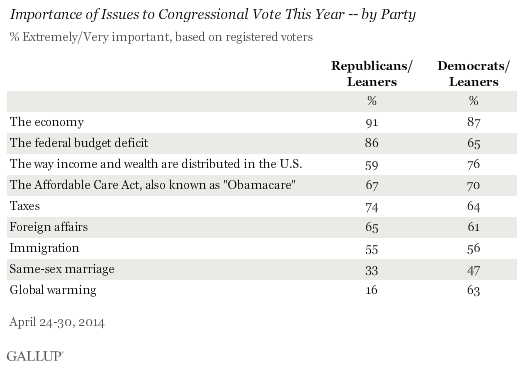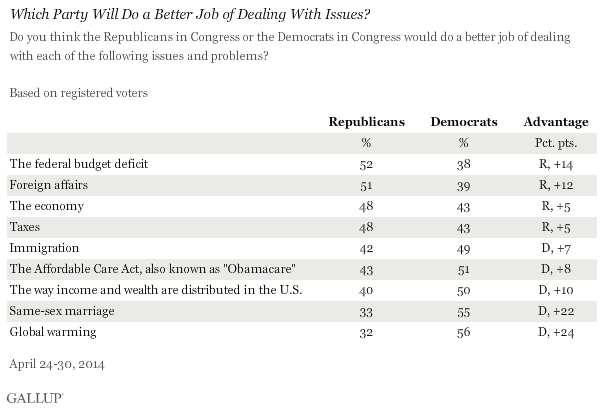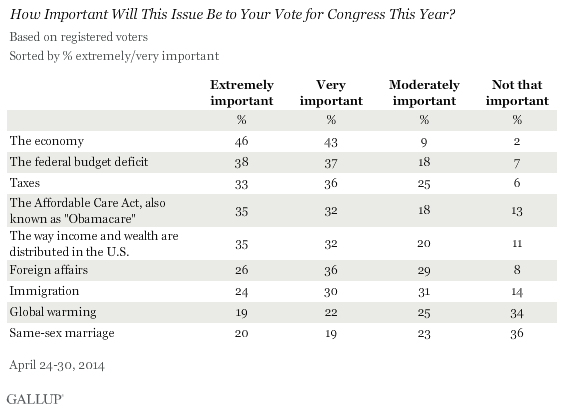PRINCETON, NJ -- American voters rate the economy as the most important issue to their vote for Congress this year, and give the Republicans in Congress a slight edge over the Democrats as best able to handle it. Voters give four other issues lower, but still above-average, importance -- the federal deficit, taxes, the Affordable Care Act, and income and wealth inequality. Voters see Republicans as better able to handle the first two, while Democrats have the edge on the latter two.

These results are from an April 24-30 Gallup survey. Registered voters were asked to rate the importance of nine issues to their vote for Congress, and then asked to indicate which party would do a better job on each issue. The accompanying graph displays the ranking of these nine issues on both of these dimensions simultaneously. The higher the issue is on the vertical axis, the more important voters say it is to their vote, while the further to the right it is, the greater the perceived Democratic advantage.
- Republicans clearly have an advantage on three economic issues, all of which voters place above-average importance on -- the "economy," the federal budget deficit, and taxes. The economy is the single most important issue tested, with 89% of voters rating it as extremely or very important. Forty-eight percent of voters say the Republicans can do the best job on the economy, while 43% say this about the Democrats. (Complete ratings for each issue are on page 2.)
- The other two issues to which voters attach slightly above-average importance are the Affordable Care Act and income and wealth inequality. Democrats have an eight- and 10-percentage-point advantage on these, respectively.
- Voters give the remaining four issues below-average importance. Republicans have the perceived advantage on handling foreign affairs, while voters give Democrats the advantage on immigration, same-sex marriage, and global warming. The Democratic advantage is particularly strong on same-sex marriage and global warming, although these two issues receive the lowest importance ratings of any of the issues tested.
Inequality, Same-Sex Marriage, Global Warming More Important to Democrats
Republicans and Democrats rate the importance of four of the issues similarly, including agreeing on the economy's importance. Democrats are significantly more likely than Republicans to rate global warming, same-sex marriage, and income and wealth inequality as important. Although same-sex marriage and global warming may have lower potential payoff in terms of the overall voting population, given their below-average importance ratings, they may still be campaign issues that Democrats can use to motivate their voting base.
Republicans give two issues a higher level of importance than do the Democrats -- the federal budget deficit and taxes.

Implications
American voters have a clearly differentiated sense of which issues will or will not be important to their vote for Congress this year. They give economy-related issues, including the distribution of income and wealth, along with the Affordable Care Act, above-average importance. Hot-button issues such as immigration and global warming, and issues that have been much in the news recently, such as foreign affairs and immigration, have below-average importance.
There is universal agreement across party lines on the importance of the economy this year, and Republicans have a slight perceptual advantage as the party best able to handle the issue, perhaps partly stemming from the blame the voters may place on the party that currently controls the White House. On the other hand, opinions diverge on the importance of issues such as global warming and same-sex marriage, with Democrats much more focused on these issues than Republicans are. While these issues may not have broad salience, they may work well as issues Democrats can use to motivate their voter base -- vitally important in midterm elections in which turnout can be as important as changing people's minds about who can best handle an issue.
Survey Methods
Results for this Gallup poll are based on telephone interviews conducted April 24-30, 2014, with a random sample of 1,336 registered voters, aged 18 and older, living in all 50 U.S. states and the District of Columbia.
For results based on the total sample of registered voters, the margin of sampling error is ±3 percentage points at the 95% confidence level.
Interviews are conducted with respondents on landline telephones and cellular phones, with interviews conducted in Spanish for respondents who are primarily Spanish-speaking. Each sample of national adults includes a minimum quota of 50% cellphone respondents and 50% landline respondents, with additional minimum quotas by time zone within region. Landline and cellular telephone numbers are selected using random-digit-dial methods. Landline respondents are chosen at random within each household on the basis of which member had the most recent birthday.
Samples are weighted to correct for unequal selection probability, nonresponse, and double coverage of landline and cell users in the two sampling frames. They are also weighted to match the national demographics of gender, age, race, Hispanic ethnicity, education, region, population density, and phone status (cellphone only/landline only/both, and cellphone mostly). Demographic weighting targets are based on the most recent Current Population Survey figures for the aged 18 and older U.S. population. Phone status targets are based on the most recent National Health Interview Survey. Population density targets are based on the most recent U.S. census. All reported margins of sampling error include the computed design effects for weighting.
In addition to sampling error, question wording and practical difficulties in conducting surveys can introduce error or bias into the findings of public opinion polls.
View survey methodology, complete question responses, and trends.
For more details on Gallup's polling methodology, visit www.gallup.com.


